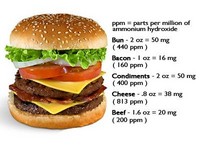
In early March, South Dakota-based BPI employed 1,300 people across four plants, averaging gross revenue of $8.6m and operating profits of $2.3m a week from sales of around 5m lbs, reveals the complaint.
“BPI was an American success story... BPI produced approximately 70% of the LFTB sold in the United States.
Today it is selling an average of 1.6m lbs of LFTB per week, generating average weekly revenues of $2.6m and an average weekly operating loss of $583,000, it adds.
Three plants have shut down, 700 people are out of work and customers with whom BPI spent years cultivating relationships have abandoned it.
And the future looks uncertain: “BPI continues to invest resources to recapture lost sales, but Defendants’ disinformation campaign and tortious interference make that a very difficult task.
“BPI conservatively estimates that Defendants’ disinformation campaign and tortious interference will cost it over $400m in profits over the next five years.”
Defendants’ ‘disinformation campaign’ was not merely case of negligent reporting
While some misinformation in the media can always be attributed to ignorance or lack of time, ABC News’ false statements about the source, nutritional profile and safety of LFTB were “not the product of merely negligent reporting”, claims BPI.
“It [the reporting] was based on knowing or reckless misstatements of facts… Defendants’ persistence—which included repeating the same misstatements after receiving information showing them to be false—indicates that Defendants intended to injure BPI and to create a consumer backlash against LFTB.”
The reporting went well beyond suggesting LFTB looked unpleasant, notes BPI, citing a series of specific falsehoods it claims were repeated by ABC reportersafter being told repeatedly that they were factually incorrect.
Specifically, ABC falsely stated that LFTB was “not really beef”, that it was a “filler” made from “waste,” “scraps,” or “low grade” beef trimmings or “connective tissues” that could be “contaminated with excrement” and were “once used only for dog food and cooking oil”.
It also falsely stated that selling ground beef that contains LFTB is “economic fraud” and falsely stated that USDA scientists “objected” to the use of LFTB in ground beef but that USDA officials “with links to the beef industry” had “overruled” the scientists.
False, defamatory, and disparaging
The network then devoted “positive coverage for stores that dropped ‘pink slime’ and negative coverage for the stores that did not do so”.
In fact, the network’s campaign against LFTB was “unparalleled in terms of its duration, its scope of false statements, and the size of the audience it reached”, claims BPI, noting in a 28 day period commencing March 7, 2012, “Defendants knowingly or recklessly made nearly 200 false, defamatory, and disparaging statements regarding BPI and LFTB”.
But the most damaging aspect to the reporting was the repeated use of the term ‘pink slime’ to describe a safe, nutritious and legal product, says BPI.
“There is not a more offensive way of describing a food product than to call it ‘slime,’ which is a noxious, repulsive, and filthy fluid not safe for human consumption.”
How is LFTB produced?

In a detailed explanation of how it produces LFTB, BPI explains that when carcasses are divided into prime cuts, smaller pieces of higher-fat muscle meat are cut off. These often contain a significant amount of lean beef that is too difficult to remove with a knife.
BPI has developed technology that mechanically separates the lean meat from the fat, enabling firms to significantly increase yields by producing an additional 10-20lbs of lean beef from every cow.
“Once they arrive at a BPI facility, the beef trimmings enter a de-sinewer in which cartilage, connective tissue, and other pieces that may incidentally accompany the trimmings are removed, leaving only the muscle tissue and fat…"
The trimmings are then put through centrifuges that remove virtually all of the fat from the beef trimmings, leaving beef that is typically 94-97% lean.
At this point, BPI introduces a small amount of ammonia gas to raise the pH of the lean meat and help remove potential pathogens, it says.
AMI: BPI is exercising its right to seek recourse from ABC for its unbalanced coverage
Fellow finely textured beef producer Cargill would not comment on whether it is also planning legal action against ABC or other media outlets, but said it is working closely with customers “to determine how best to re-introduce FTB in their ground beef”.
Director of communications Michael Martin added:“The issue is perception, not facts or science, since FTB is 100% beef, 95%+ lean, reduces waste, increases available lean beef, keeps price down and has been consumed for 20 years without issue - until last March.” American Meat Institute president J. Patrick Boyle said the AMI stood by the safety and nutrition of lean finely textured beef.
He added: “BPI is exercising its right to seek recourse from ABC for the unprecedented and, in our view, unbalanced coverage, of this safe and nutritious beef product. We will await the court’s review of all the facts in this case.”
ABC News, which owned by Walt Disney, issued a statement from senior vice president Jeffrey W. Schneider saying the firm would “vigorously contest the lawsuit”, which was “without merit”.





